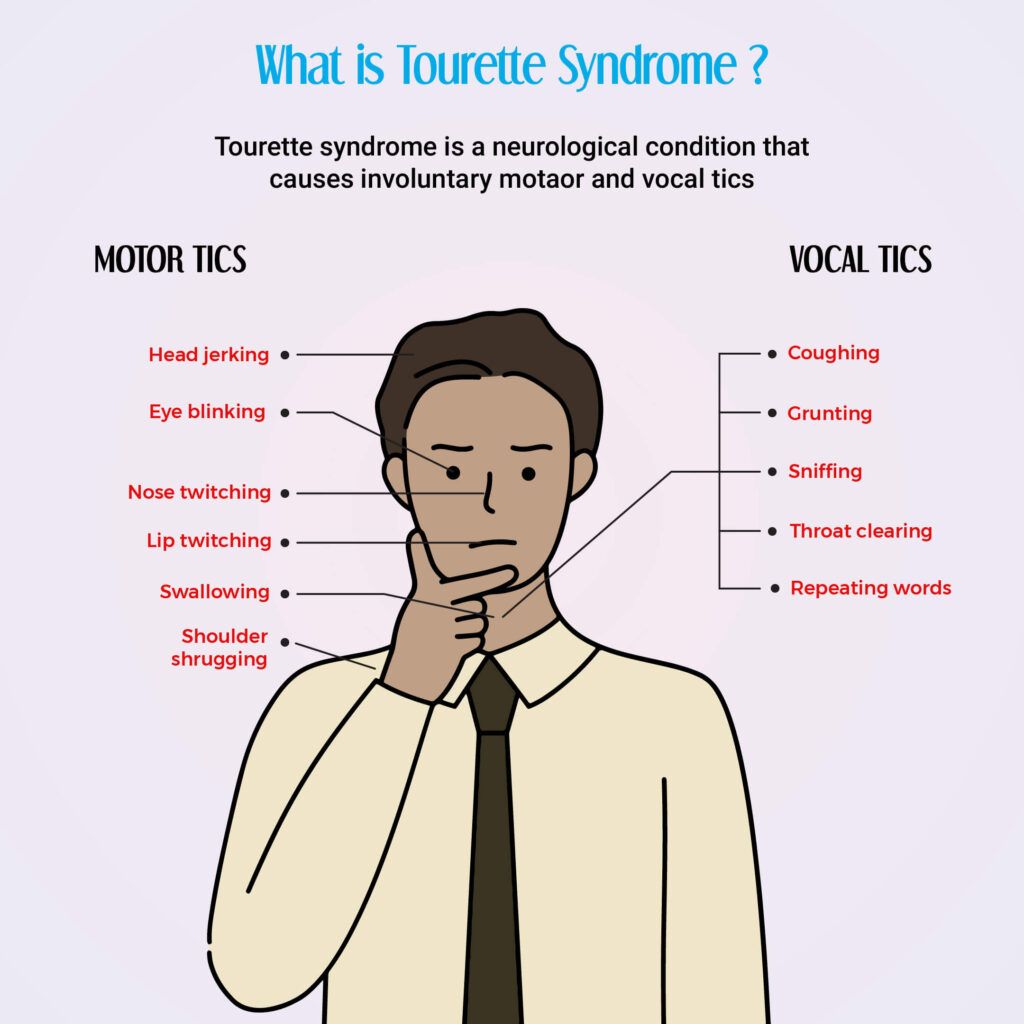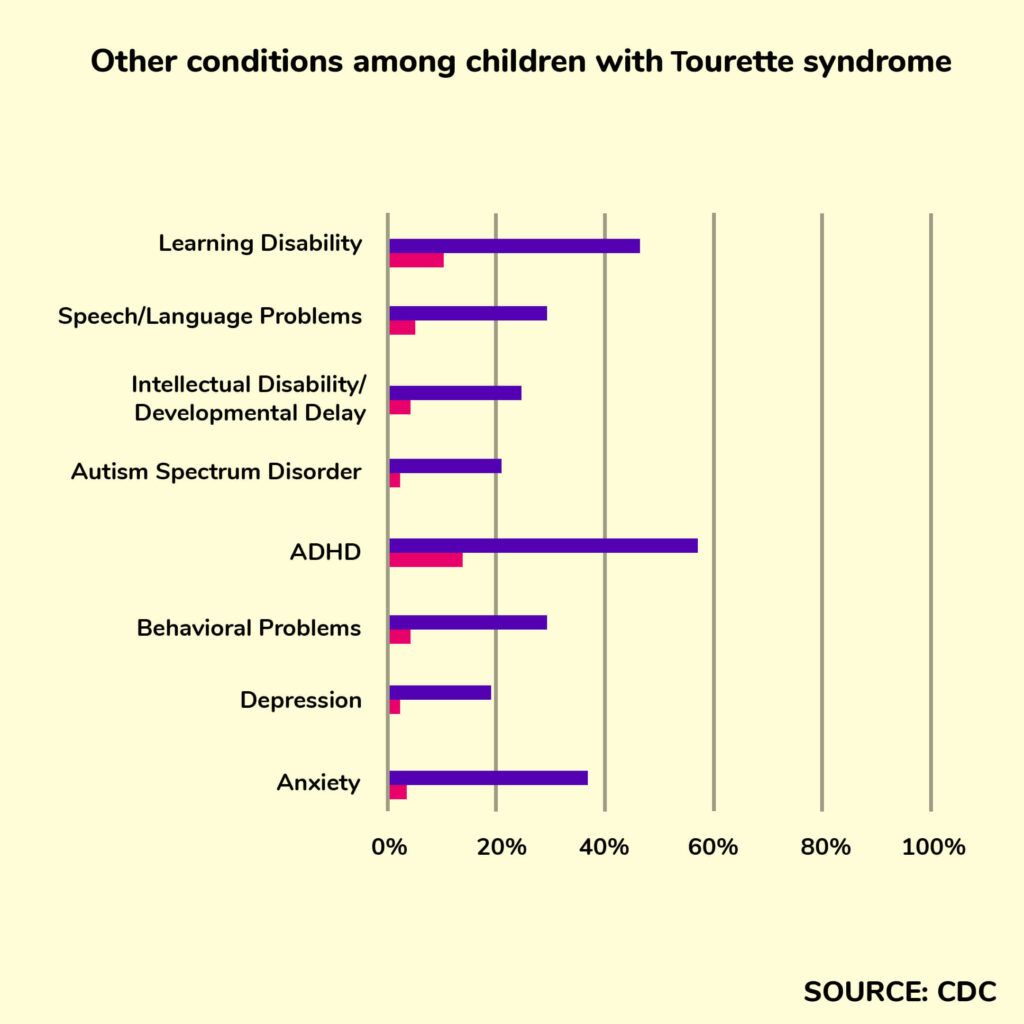Tourette Syndrome At A Glance
Tourette syndrome or disorder is a complex neurological condition characterized by sudden, repetitive, involuntary movements and noises called tics.
Tics usually show up in childhood, and their severity varies with time.
In most people with Tourette syndrome, the tics become milder and less frequent as they grow older.
People with Tourette syndrome show motor tics (uncontrolled body movements) and vocal tics (outbursts of sound).
One to ten in 1000 children may develop Tourette syndrome, but its exact incidence is unknown.
Tourette syndrome is also more common in people assigned male at birth (MAB) than those assigned female at birth (FAB).
Symptoms of Tourette Syndrome
The symptoms of Tourette syndrome begin between ages 5 and 10.
In children, the initial symptoms are usually mild, simple tics of the face, head, or arms.
Over time, the child may develop different tics that may happen more often and involve other body parts, like the trunk and legs.
Though symptoms vary in each child, a few involuntary, purposeless motor movements observed in Tourette syndrome include:
- Head jerking
- Squinting
- Blinking
- Shrugging of shoulders
- Nose twitching
Vocal tics usually appear much later than motor tics and include:
- Grunting or moaning sounds
- Barks
- Tongue clicking
- Sniffs
- Squeaking sounds
- Throat clearing
- Gurgling
- Whistling
Some people show complex tic behaviors that may look purposeful, such as:
- Kissing
- Pinching
- Lip-smacking
- Sticking their tongue out
- Touching
- Obscene gestures
Image: Is Tourette Syndrome Genetic? Symptoms of Tourette’s
What Causes Tourette Syndrome
Though the exact cause of Tourette syndrome is unknown, genetics and environmental factors are said to play a role in its occurrence.
Is Tourette Syndrome Genetic?
The cause of Tourette syndrome is poorly understood.
Although environmental factors may play a role, genetic factors are thought to be the primary drivers of the pathogenesis of this disorder.
The fact that Tourettes has been seen running in families further substantiates the underlying genetic role.
Laboratory research has uncovered several loci (genetic regions) and genetic mutations associated with Tourette syndrome.
The several genetic changes identified may play an important role in explaining the variable symptoms observed in people with Tourette’s.
Is There A Tourette’s Gene?
So far, no gene has been identified that is directly said to cause Tourette syndrome.
However, mutations in the SLITRK1 gene have been identified in a small group of people with Tourette syndrome.
The SLITRK1 gene gives instructions for producing a protein that probably plays a role in nerve cell development.
However, how the SLITRK1 gene causes Tourette syndrome is unknown.
Inheritance of Tourette Syndrome
Though the condition has a strong genetic link, the inheritance pattern of Tourette syndrome is unclear.
Tourette syndrome was previously thought to have an autosomal dominant pattern of inheritance (one affected or mutated gene copy in each cell is sufficient to cause the condition).
However, several decades of research have shown this is not the case.
Studies have shown that almost all Tourette syndrome cases result from genetic and environmental factors and not a single gene.
Other Risk Factors For Tourette Syndrome
The risk factors for Tourette syndrome are unknown, but genes play a significant role.
Few suspected risk factors that may cause Tourette syndrome are:
- Abnormal metabolism of a brain chemical (neurotransmitter) called dopamine
- Smoking during pregnancy
- Complications during pregnancy
- Low birth weight
- Head injury
- Carbon monoxide poisoning
- Infections like encephalitis (brain inflammation)
Image: Is Tourette Syndrome Genetic? Children with Tourette’s
Diagnosis and Treatment of Tourette Syndrome
Diagnosis
Tourette syndrome is usually diagnosed by a pediatrician or a qualified mental health professional who can identify the symptoms in children and adolescents.
The professional performs a comprehensive evaluation of the child or adolescent to diagnose Tourette syndrome, including
- Detailed information about behavior from parents and teachers.
- Symptoms
- Health history
- Family health history
- Psychological, social, and educational status
Most children are around seven years old when diagnosed with this disorder.
Treatment
The treatment for Tourette syndrome in children depends upon several factors, including the severity of the condition.
While many children may not require treatment, some may require special classes, psychotherapy, and medications.
Comprehensive behavioral intervention for tics can help children manage and reduce tics.
Children with ADHD, OCD, or mood disorders may require medications.
Summary: Is Tourette Syndrome Genetic?
- Tourette syndrome is a neurological condition characterized by sudden, involuntary movements called tics.
- Tourette's is four times more likely to occur in boys than in girls.
- A few common symptoms of Tourette symptoms include head jerking, blinking, shrugging, and vocal tics.
- A complex interplay of genetics and environmental factors is suspected of causing Tourette syndrome.
- Tourette's was previously thought to be an autosomal dominant condition; however, years of research have disproved it.
- Tourette syndrome is usually diagnosed by pediatricians or mental health professionals after a comprehensive evaluation of the child.
References
- https://www.cdc.gov/ncbddd/tourette/riskfactors.html
- https://medlineplus.gov/genetics/condition/tourette-syndrome/
- https://rarediseases.info.nih.gov/diseases/7783/tourette-syndrome
- https://www.hopkinsmedicine.org/health/conditions-and-diseases/tourettes-disorder
- https://www.nature.com/articles/nrneurol.2012.26
- https://www.purdue.edu/newsroom/releases/2019/Q1/study-finds-gene-associated-with-higher-risk-of-tourette-syndrome.html
- https://www.childrenshospital.org/conditions/tourettes-syndrome#symptoms--causes







